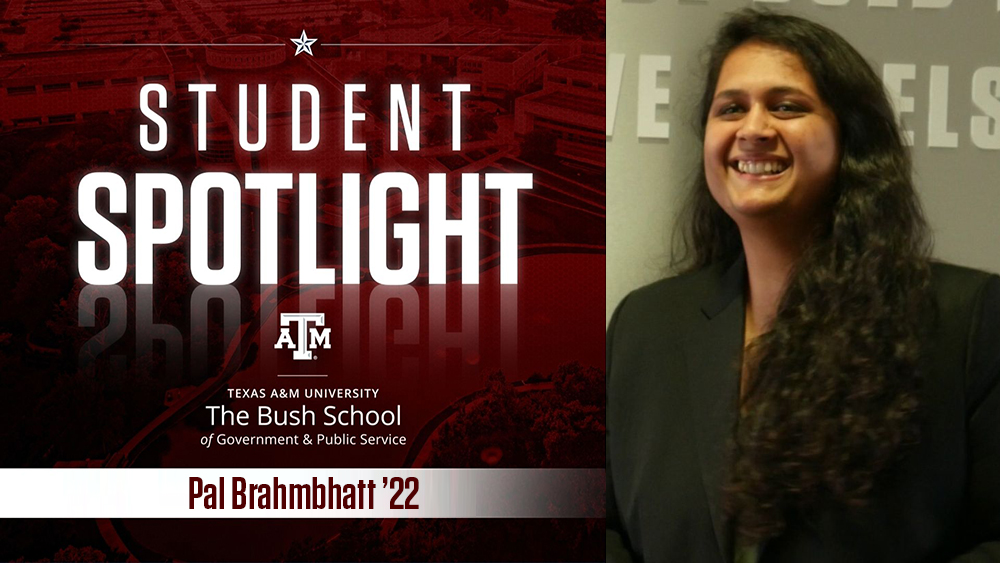
Learn more about why students have chosen the Bush School of Government & Public Service as Pal Brahmbhatt ’22, Master of Public Service and Administration candidate, discusses her experience at the Bush School.
Introduce yourself.
My name is Pal Brahmbhatt and I’m a second-year Master of Public Service and Administration (MPSA) student here at the Bush School. I’m on the nonprofit management track. I have mixed concentrations in international nongovernmental organizations with women, peace and security. I was born in India but grew up in Tanzania. While growing up in Dar es Salaam, I invested a lot of time volunteering with different nonprofits. It’s something I always liked doing. After completing my schooling, I moved back to India and completed a bachelor’s in international relations and mass communications. During those four years I was interning and working with different non-profits. It gave me an idea of how nonprofits function and work in developing nations. Then I took an initiative to start a non-profit of my own. We started with four children and now are a class of 418 or 19. It made a lot more sense to then start a master’s in public service and administration, especially on the non-profit management track.
How would you describe your Bush School experience so far?
My Bush School experience thus far has been incredible, honestly. I just love the Bush School. The people here are amazing. It doesn’t matter who it is. It could be people I study with or other people from other different classes or first-year students or whoever. It has been a great experience to meet so many people from different walks of life. Everyone’s interested in serving the public at large, and that’s what keeps all of us together here at the Bush School. I also love the fact that the MPSA [program] is flexible in terms of what courses I can pursue or designing a degree that suits my interest. Being an MPSA student, I still have been taking a lot of courses in the International Affairs (IA) program or sociology and other departments too. Lastly, the capstone experience really has been great in terms of working with people, working with real life clients and seeing how public policy issues are real and how difficult it is to navigate through them. Public service is a noble calling, and there literally is no place like the Bush School that reflects this better.
What did you do the summer between your first and second year, and how does that translate to the way you’re going to approach your studies and your work experience after you graduate?
Last summer I interned as a program evaluation intern with Catholic Charities of Central Texas, a non-profit organization based in Austin that also has an office here in Bryan. I took a course in program evaluation in the first year during my second semester. It made sense to complete that course and then intern with an organization and just see how program evaluation looks like on real grounds, and also for a nonprofit organization that functions within the United States. I do not have a lot of experience with how nonprofits function here. It has been incredible understanding the challenges that these organizations face here in terms of funding or data collection and stuff like that. I’ve always been interested in program evaluation, monitoring and implementation, and that’s what I’ll be pursuing after completing my graduate school. This was a good start.
What’s a challenge that you’ve encountered, and how did you overcome it?
Trying to overcome the idea of how writing a perfect paper. That’s something I think that’s very common for almost every single student here at the Bush School. You’re always trying to write the best paper manage time as efficiently as possible. You fail, at least in the first semester because you’re new, and it’s overwhelming. That’s how my story was too. I remember taking this workshop on time management. That really helped me in terms of trying to understand how the perfect paper doesn’t exist in the first place. It’s just your mind trying to play around with you, so you might as well just accept the fact that it doesn’t exist and you put in your best work. It was more about trying to overcome your own mind and thoughts.
What advice would you give to first-year students?
Remember who you are and remember why you are here in the first place. When you start your grad school program, you will be overwhelmed at first. I know we’ll all have different commitments, work or like different family commitments, so it gets overwhelming. Whenever things feel like you can’t do this, just remember you can. Every single person who was here before us has done it too. There’s nothing you can’t do. And give yourself enough credit. Remember that you’re okay, and it’s not that difficult.

